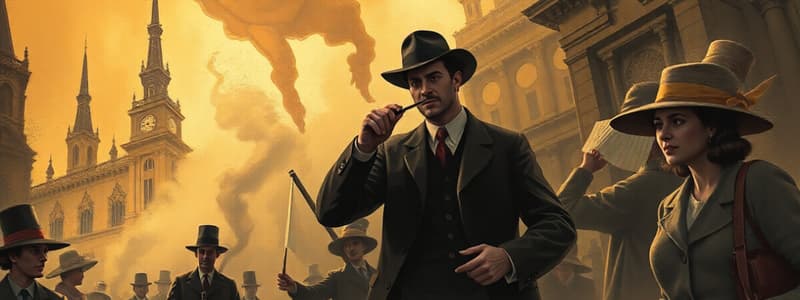Podcast
Questions and Answers
What was the primary goal of the NAACP when it was founded?
What was the primary goal of the NAACP when it was founded?
- To secure political, educational, social, and economic equality for African Americans (correct)
- To establish a system of sharecropping
- To promote the abolition of slavery
- To support the formation of settlement houses
What does the term 'Muckrakers' refer to in the context of the Progressive Era?
What does the term 'Muckrakers' refer to in the context of the Progressive Era?
- Politicians advocating for women's suffrage
- Journalists exposing corruption and social injustices (correct)
- Business leaders promoting imperialism
- Activists fighting against Jim Crow laws
How did the 'Big Stick' diplomacy differ from other foreign policies?
How did the 'Big Stick' diplomacy differ from other foreign policies?
- It focused solely on economic sanctions
- It emphasized military intervention as a means of diplomacy (correct)
- It advocated for isolationism in international affairs
- It involved unrestricted trade agreements
What was the significance of the 19th Amendment?
What was the significance of the 19th Amendment?
What was the main outcome of the Plessy v. Ferguson decision?
What was the main outcome of the Plessy v. Ferguson decision?
Flashcards
“Big Stick” Diplomacy
“Big Stick” Diplomacy
Theodore Roosevelt's foreign policy approach, emphasizing a strong military presence and willingness to use force to protect American interests.
Social Gospel
Social Gospel
A movement within American Protestantism in the late 19th and early 20th centuries that sought to apply Christian principles to social problems, such as poverty and inequality.
Upton Sinclair’s The Jungle
Upton Sinclair’s The Jungle
A 1906 novel by Upton Sinclair that exposed the unsanitary and dangerous conditions of the meatpacking industry in Chicago. It was a significant factor in the passage of the Meat Inspection Act and the Pure Food and Drug Act.
Ida Tarbell’s History of Standard Oil
Ida Tarbell’s History of Standard Oil
Signup and view all the flashcards
Sharecropping
Sharecropping
Signup and view all the flashcards
Study Notes
Prohibition
- 18th Amendment: Established prohibition of alcoholic beverages in the US.
Social Gospel
- A movement within Protestantism that applied Christian ethics to social problems.
Jane Addams
- Key figure in the settlement house movement, founded Hull House.
Hull House/Settlement Houses
- Community centers providing social services to the poor and immigrants.
Ida Tarbell's History of Standard Oil
- A muckraking exposé of the Standard Oil Company's business practices.
Muckrakers
- Investigative journalists who exposed corruption and social problems.
"Big Stick" Diplomacy
- Theodore Roosevelt's foreign policy approach using military strength.
Upton Sinclair's The Jungle
- A muckraking novel exposing unsanitary conditions in the meatpacking industry.
Sharecropping and Crop Lien
- Systems of agricultural labor in the South, often trapping people in debt.
Plessy v. Ferguson
- Supreme Court decision upholding racial segregation ("separate but equal").
NAACP
- National Association for the Advancement of Colored People, advocating for racial equality.
Jim Crow Laws
- State and local laws enforcing racial segregation in the Southern United States.
Initiative
- A process allowing citizens to propose and vote on laws directly.
Panama Canal
- A waterway connecting the Atlantic and Pacific Oceans, built by the US.
Roosevelt Corollary
- Extension of the Monroe Doctrine, giving the US the right to intervene in Latin American affairs.
19th Amendment
- Granted women the right to vote.
Theodore Roosevelt
- President of the United States, known for progressive reforms and "Big Stick" diplomacy.
17th Amendment
- Provided for the direct election of US Senators by the people.
Philippine-American War
- Conflict between the United States and the Philippines following the Spanish-American War.
Spanish-American War
- War between Spain and the United States, resulting in US acquisition of territories.
Imperialism
- Policy of extending a country's power and influence through diplomacy or military force.
Yellow Journalism
- Sensationalized journalism that often exaggerated or fabricated news stories.
Trust Busting
- Roosevelt's policy to break up monopolies and trusts.
Woodrow Wilson
- President of the United States, known for progressive reforms and foreign policy initiatives.
Square Deal
- Theodore Roosevelt's domestic program, focusing on controlling corporations, protecting consumers, and conserving natural resources.
Studying That Suits You
Use AI to generate personalized quizzes and flashcards to suit your learning preferences.




